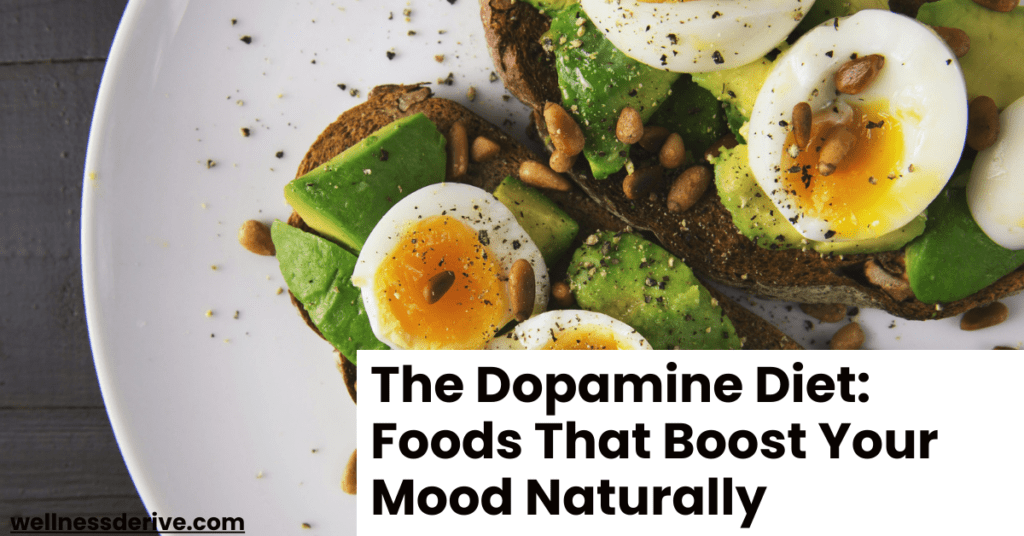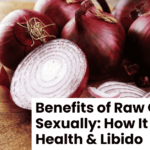In this article, we will discuss the dopamine diet—foods that naturally boost your mood and help you manage cravings. You may have noticed that what you eat has a deep impact on how you feel. The reason is dopamine.
It is a neurotransmitter that helps control our ability to experience pleasure and reinforces behaviors that are rewarding to our brains. When dopamine levels are deficient, it can result in symptoms like fatigue, heightened cravings for unhealthy foods, and an increased tendency to seek immediate gratification.
When you indulge your cravings by consuming high amounts of highly processed foods, your dopamine levels drop even further, leading to even more cravings. Over time, this habit brings a host of serious ailments along with it.
The only way to break this vicious cycle is through a balanced diet rich in healthy fats, carbs, proteins, and micronutrients. Instead of binge eating hyper-palatable foods, replenish your body with healthier alternatives for a dopamine boost.
Additionally, certain foods increase dopamine levels in the brain, which can significantly impact mood and overall life satisfaction.
What is the Dopamine Diet?
The Dopamine Diet is a weight loss regime designed to boost your mood and help you shed pounds by increasing levels of the ‘happy hormone,’ dopamine. This diet is based on the idea that certain foods can enhance dopamine production in the brain, leading to improved mood, motivation, and weight loss. By focusing on foods rich in amino acids, such as lean proteins, unprocessed meats, oily fish, and dairy foods, you provide your body with the essential building blocks for dopamine production. Incorporating these foods into your diet can help you feel more energized, motivated, and satisfied, making it easier to stick to your weight loss goals.
Dopamine Deficiency and Substance Abuse
Dopamine deficiency can trigger a condition called Reward Deficiency Syndrome. This condition makes it difficult to experience pleasure from everyday activities, prompting individuals to seek a quick alternative in hyper-palatable foods like soda, cookies, and deep-fried snacks.
These foods cause a rapid spike in dopamine, offering a fleeting sense of satisfaction. Over time, the brain becomes dependent on these high-reward foods to feel pleasure, similar to how individuals with substance abuse disorders rely on drugs or alcohol.
Most versions of the dopamine diet recommend avoiding alcohol as part of a broader set of guidelines aimed at promoting a balanced diet and enhancing mood.
Both behaviors stem from our brain’s struggle to maintain balance, resulting in a cycle of cravings, overconsumption, and addiction.
If you’re currently battling substance addiction or facing the difficult challenge of withdrawal symptoms, be assured that you don’t have to face this battle on your own. Many individuals have walked this path and found a way through effective support for substance abuse.
As stated by Purpose Healing Center, addiction treatment programs include customized inpatient and outpatient care, mental health services, and medical detox. These programs not only help overcome addiction but also find a renewed sense of purpose.
The Cycle of Binge-eating, Weight Gain, Obesity and Dopamine Deficiency
Studies have shown that obese individuals have lower levels of dopamine D2 receptors compared to those of normal weight. This deficiency can either be a cause or a consequence of obesity. As we explained previously, low dopamine levels can contribute to pathological eating habits and increased reward seeking behaviour, which inevitably lead to weight gain.
Four in every 10 adults in North America are suffering from obesity and related problems. Obesity can cause serious body image issues, low self-esteem, and multiple chronic conditions such as joint pain, high blood pressure, and an increased risk of diabetes and heart disease.
If diet and exercise alone aren’t giving you the results you want, consider using drugs to shed the pounds. However, medication alone won’t solve the problem. To see lasting results, you must pair it with healthy eating, consistent exercise, and emotional support. Without this holistic approach, progress will be limited.
Low-calorie Foods That Increase Dopamine Production
Here is a list of foods that have been shown to elevate dopamine levels, including sources of lean protein such as unprocessed meats, eggs, and fish.
Incorporating protein foods like lean meats, eggs, and dairy into your diet can help boost dopamine production, reduce cravings, and promote feelings of fullness.
Food Rich in Tyrosine and Lean Protein
Tyrosine, a type of amino acid, is the building block of dopamine. Simply put, when you eat foods rich in tyrosine, your body has the raw material it needs to produce more dopamine. This is important because dopamine is responsible for your mood, motivation, and even your ability to resist cravings.
If you’ve been feeling low or stuck in a cycle of emotional eating, adding tyrosine-rich foods to your diet can directly help boost your dopamine levels, giving you more energy, focus, and a better sense of well-being.
Foods rich in tyrosine include:
- Chicken (lean meat)
- Fish
- Beef (lean meat)
- Pork chops
- Turkey
- Fish
- Tofu
- Eggs
- Pumpkin seeds
Foods Rich in Magnesium
Magnesium is essential for your brain’s dopamine receptors to function properly, yet many people don’t get enough of it. A recent study states that 2.5 to 15% of Americans exhibit symptoms of magnesium deficiency.
The reality is that most of us aren’t getting the recommended daily intake. Magnesium helps regulate dopamine, so when you’re low on it, your brain struggles to use dopamine effectively. Including foods that stabilise blood glucose levels, such as low-GI carbohydrates like rye bread and oats, can also positively impact your appetite and overall health.
This can lead to feelings of stress, anxiety, and low energy. By including more magnesium-rich foods in your diet, you can help support your brain’s ability to produce and utilize dopamine effectively.
Foods high in magnesium include:
- Spinach
- Almonds
- Avocados
- Dark chocolate
- Bananas
- Legumes
Other Foods
Your daily diet needs to include a balanced diet with a healthy amount of leafy greens, fruits, and dairy products. Fruits, veggies, and dairy products are packed with essential micronutrients and healthy fats, all of which are important for our brain and gut health.
Beverages like green tea contain compounds that help enhance dopamine activity. These foods not only support dopamine but also promote better overall brain health, helping you feel your best each day.
Make sure your diet also includes a healthy amount of the following:
- Leafy greens like kale, spinach, lettuce.
- All kinds of fruits, including lots of berries for antioxidants.
- Yogurt, buttermilk, cheese.
- Green tea
- Coffee
Foods to Avoid on the Dopamine Diet
While the Dopamine Diet emphasizes foods that boost dopamine production, it also recommends avoiding certain foods that can disrupt this process and lead to weight gain. Here are some foods to steer clear of:
- Processed Sugar: Consuming high amounts of processed sugar can lead to increased reward-seeking behavior and weight gain. It causes a rapid spike in blood glucose levels, followed by a crash, which can leave you craving more sugary foods.
- Alcohol: Excessive alcohol consumption can disrupt dopamine production and contribute to weight gain. It can also interfere with your sleep and overall well-being.
- Caffeine: While caffeine may provide a temporary energy boost, excessive consumption can lead to decreased dopamine levels and weight gain. Moderation is key.
- Processed Meats: Processed meats are high in unhealthy fats and low in essential nutrients, making them a poor choice for dopamine production. Opt for unprocessed meats instead.
- Refined Carbohydrates: Refined carbohydrates can cause a spike in blood glucose levels, leading to increased reward-seeking behavior and weight gain. Choose whole grains and complex carbs for sustained energy.
By avoiding these foods, you can support your body’s natural dopamine production and maintain a healthier weight.
Lifestyle Factors That Support Dopamine Production
In addition to diet, certain lifestyle factors can significantly enhance dopamine production and overall well-being. Here are some key practices to consider:
- Regular Exercise: Physical activity has been shown to increase dopamine levels and improve mood. Aim for at least 30 minutes of moderate exercise most days of the week.
- Adequate Sleep: Getting enough sleep is essential for dopamine production and overall health. Aim for 7-9 hours of quality sleep each night to support your brain’s ability to produce and utilize dopamine effectively.
- Stress Management: Chronic stress can disrupt dopamine production, making stress management techniques such as meditation, yoga, and deep breathing exercises essential for maintaining balance.
- Social Connections: Building and maintaining social connections and relationships can increase dopamine levels and improve mood. Spend time with loved ones, engage in social activities, and nurture your relationships.
By incorporating these lifestyle factors into your routine, you can support your body’s natural dopamine production and enhance your overall well-being.
The Benefits of the Dopamine Diet
Following the Dopamine Diet offers several benefits that can positively impact your life:
- Weight Loss: By increasing dopamine production, the diet can help reduce cravings and lead to weight loss. The focus on lean proteins and healthy fats can keep you feeling full and satisfied.
- Improved Mood: The diet’s emphasis on foods that increase dopamine production can lead to improved mood and reduced symptoms of depression. You’ll feel more positive and motivated.
- Increased Motivation: The diet’s focus on lean proteins and healthy fats can increase motivation and energy levels, helping you stay on track with your goals.
- Improved Overall Health: The diet’s emphasis on whole, unprocessed foods can lead to improved overall health and a reduced risk of chronic diseases. You’ll benefit from better digestion, more stable blood glucose levels, and enhanced brain function.
By following the Dopamine Diet, you can experience these benefits and enjoy a healthier, more balanced life.
How to Implement the Dopamine Diet
Implementing the Dopamine Diet is simple and straightforward. Here are some tips to get started:
- Focus on Whole, Unprocessed Foods: Emphasize lean proteins, unprocessed meats, oily fish, dairy foods, and whole grains in your diet. These foods provide the essential nutrients needed for dopamine production.
- Increase Protein Intake: Aim for 0.8-1 gram of protein per kilogram of body weight per day. Protein-rich foods like chicken, fish, eggs, and tofu are excellent choices.
- Healthy Fats are Essential: Include sources of healthy fats such as nuts, seeds, avocados, and olive oil in your diet. These fats support brain health and dopamine production.
- Stabilize Blood Glucose Levels: Eat regular meals and include protein and healthy fats to stabilize blood glucose levels. This helps prevent energy crashes and cravings.
- Avoid Processed Foods: Limit or avoid processed foods, including sugary drinks, refined carbohydrates, and processed meats. These foods can disrupt dopamine production and lead to weight gain.
By following these tips and incorporating the Dopamine Diet into your lifestyle, you can increase dopamine production, improve mood, and achieve weight loss.
Take Control of Your Well-being
Make small, consistent changes today, not just in your diet but in your overall approach to life. Get out more often, soak up the sun, play a sport, walk your dog, and talk to a friend. All of these activities naturally produce dopamine. A balanced diet that includes a variety of food groups, such as proteins, vitamins, and healthy fats, is also essential for overall health.
And if you need more help, rest assured that it’s always available. Most versions of the dopamine diet recommend avoiding alcohol as part of a broader set of guidelines aimed at promoting a balanced diet and enhancing mood.



